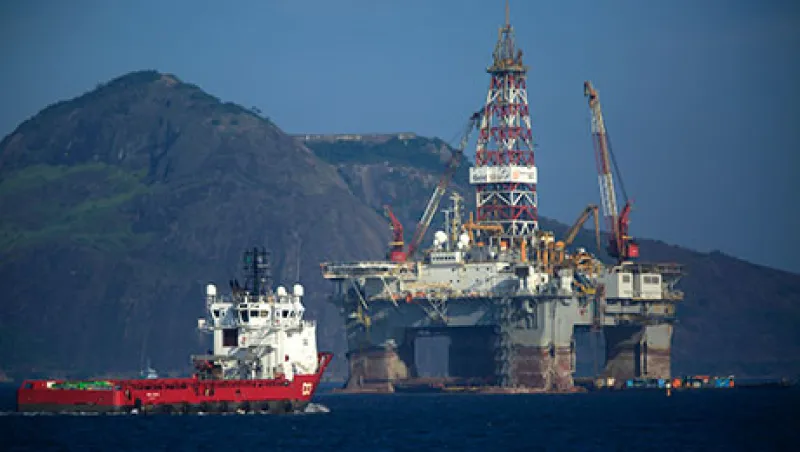After years in the financial wilderness because of its mounting debt and widening corruption scandal, Petróleo Brasileiro is showing signs of recovery.
In late April the giant state-owned oil company issued a long-delayed fourth-quarter 2014 earnings report and sought to draw a line under its troubles by taking a 44.6 billion real ($14.1 billion) write-down for overvalued assets and an additional 6.2 billion reais for costs related to the alleged graft. “We have made our best efforts to turn the page on this sad chapter that the company has passed through,” chief executive Aldemir Bendine, who came on board in February, told reporters after the announcement.
The company followed up last month by announcing earnings of 5.33 billion reais in the first quarter of 2015. That was down 1.1 percent from a year earlier but well in excess of analysts’ expectations. The return to seeming financial normalcy, combined with a recent rally in global oil prices, has pushed the price of Petrobras’s New York Stock Exchange–listed shares up by two thirds from a mid-March low to stand at $8.35 at the end of May. The price of the company’s bonds maturing in 2019 has rallied from 85 cents on the dollar in March to 97 cents, reducing the yield to about 4.5 percent. Petrobras tested the market’s newfound confidence on June 1 with a rare issue of 100-year bonds, raising $2.5 billion at an interest rate of 8.45 percent.
Petrobras’s rebound is welcome news for Brazil’s beleaguered national economy and government. The company dominates an oil and gas sector that contributes some 13 percent to gross domestic product, and the corruption scandal, revolving around allegations of massive kickbacks to private contractors and politicians, has threatened to touch President Dilma Rousseff, who served as chair of the company from 2003 to 2010. But analysts and investors say the easy gains in Petrobras securities are likely over.
The company is far from clear of its governance problems. Dozens of executives from Petrobras and its contractors have been arrested on suspicion of bid-rigging. A judge convicted eight people, including the former head of Petrobras’s downstream division, of crimes related to the scandal in April; others are awaiting trial.
Analysts and investors are more worried, however, about the company’s structural challenges. Its finances are strained by debt of $132 billion, or close to five times earnings before interest, taxes, depreciation and amortization; its deepwater wells continue to demand huge capital expenditure; and the country’s regulatory regime forces Petrobras to sell refined products and gasoline at a loss within Brazil. “Now comes the hard part for Petrobras, selling assets and growing production with tighter budgets,” says Ryan McGrail, senior credit analyst at Loomis, Sayles & Co., a Boston-based asset manager that controls some $240 billion.
Expensive offshore projects, haphazard cost management and bountiful credit markets have combined to make Petrobras one of the world’s most leveraged energy companies, notes Pavel Molchanov, a Houston-based oil and gas analyst for brokerage Raymond James. “It may have drawn a line under the scandal, but it remains probably the highest-risk large-cap oil stock in the world,” he says.
State-owned China Development Bank gave Petrobras a breather from its creditors with a $3.5 billion loan earlier this year, but that is just a fraction of the $36.4 billion the company needs to repay over the next three years, according to a recent report from J.P. Morgan Securities. Management’s plan for $13 billion in asset disposals by the end of next year is also too modest, McGrail says: “They need to sell some of the best assets, meaning stakes in the deepwater projects. Instead, they are looking to sell other stuff, like pipelines and refineries.”
Diluting Petrobras’s share in its upstream crown jewels, particularly its so-called pre-salt fields in deep waters off the Atlantic coast that are producing some 500,000 barrels of oil a day, will be a tough sell politically and a challenge economically, given the uncertain outlook for oil prices. The company has also ruled out a capital increase, as that would dilute the state’s slim 50.3 percent majority of voting shares. Politics weighs no less heavily on the giant’s downstream operations, which are subject to price controls as a sop to Brazilian consumers. The arrangement locks Petrobras into an expensive catch-22: The more it earns from crude oil, the more it loses subsidizing fuel costs. The damage came to $30 billion in the three years from 2011 to 2013, when oil was riding high, J.P. Morgan calculates. (Conversely, that bleeding slows when crude prices drop, cushioning the blow to the company’s bottom line.)
Negotiating this thicket of problems falls to the 51-year-old Bendine, who until a few months ago had never worked in the energy industry. His previous job was CEO of state-owned Banco do Brasil, where he worked his way up the ladder over three decades. He brought with him a team, including chief financial officer Ivan Monteiro, to replace associates of disgraced ex-CEO Maria das Graças Foster. Markets have welcomed Bendine as a safer pair of hands but question his ability to push through a thorough restructuring. “They recruited a career political hatchet man as CEO,” says Charles Sizemore, a Dallas-based financial adviser who published a prescient buy recommendation on Petrobras in December. “The burden is on the new management to prove they are up to the job.”
Petrobras may have become an acceptable investment again, but that does not make it a wise one. The shares have recovered from their recent lows, but they remain far below the highs of more than $72 hit back in 2008, when bullishness about the company’s ability to tap its massive reserves in deep offshore waters was at a peak. “The stock has run about as far as it will go, barring a more dramatic recovery in oil prices,” Raymond James’s Molchanov says. “If you’re looking for a way to play the rebound in oil, there are better ways to do that.”





